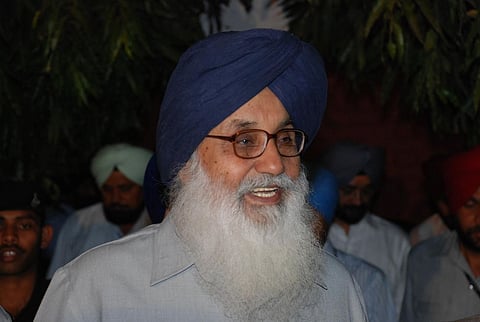
- Home
- न्यूजग्राम
- NewsGram USA
- India
- World
- Politics
- Entertainment
- Culture
- Lifestyle
- Economy
- Sports
- Sp. Coverage
- Misc.
- NewsGram Exclusive
- Jobs / Internships

Chandigarh: With just over a week to go for the second Progressive Punjab Investors Summit-2015, Chief Minister Parkash Singh Badal is making appeals and even seeking divine intervention for the return of peace and normalcy in the frontier state.
Violent protests, multiple roadblocks across Punjab, youths out on the streets brandishing swords, sticks and other traditional weaponry, shops and establishments being forced to shut down, railway tracks being blocked for days by agitating farmers, rumours being spread through social media to create differences on religious lines and radical elements having a free run – this is certainly not the image that the Punjab government would want the country's top industrialists and investors to see about the state.
The investors' summit, which is the brainchild of Deputy Chief Minister Sukhbir Singh Badal, who himself is a billionaire businessman with interests in hotels, agriculture, infrastructure, media and some other fields, could take a hit with Punjab being on the boil in the past one month.
First, it was the farmers – the backbone of Punjab's economy – who blocked railway tracks for several days, affecting nearly 900 trains, demanding higher compensation for their crop loss. The agitation was the outcome of a scam in purchase of spurious pesticide – which led to the loss of the cotton crop.
This was followed by protests and violence after the alleged sacrilege of the Guru Granth Sahib, the holy book of the Sikhs. Radical elements, who had been sidelined over the years after militancy ended in the state in 1995, found a new opening to re-launch themselves. The Badal government, which promised to maintain peace in the state at all costs, was seen faltering and even the elder Badal had to land up at Harmandar Sahib, popularly known as the Golden Temple, to seek divine intervention for peace and normalcy.
Then, radical elements in the state got pumped by the flip-flop of the Akal Takht, the highest temporal seat of the Sikh religion, which first announced its "pardon" for controversial Dera Sacha Sauda sect chief Gurmeet Ram Rahim Singh, who was accused of hurting religious sentiments of Sikhs in 2007 when he dressed up like Guru Gobind Singh. The Akal Takht has now, in a complete U-turn, reversed its decision.
The investors' summit on Oct 28-29, to be held on the campus of the Indian School of Business in Mohali near here, will focus on agro- and food processing, life-sciences, information technology and its enabled services, skill development, health, manufacturing, education, renewable energy, aerospace and defence and tourism sectors.
Big names from the industry are expected to participate this time too. The last summit, in December 2013, saw the likes of Reliance chairman Mukesh Ambani, steel tycoon L.N. Mittal, ITC's Y.C. Deveshwar, Biocon's Kiran Mazumdar-Shaw, L&T's A. M. Naik, Hero Group's Sunil Kant Munjal, DLF's Rajiv Singh, Bharti Airtel's Sunil Bharti Mittal and many others attending.
Despite claims by Sukhbir Badal, the first summit has hardly made any impact on the ground in terms of big investments in Punjab. This time too it is not going to be any different.
All the happenings in Punjab in the past month are hardly going down well with any prospective investor. The state's "progressive" image would surely take a hit.
Perhaps because of this, on Tuesday, the chief minister, the ruling Shiromani Akali Dal and the Shiromani Gurdwara Parbhandak Committee asked the people to orgnaise "akhand paths" (prayers) in towns and villages across Punjab to restore peace in the state.
The question is: Will divine intervention succeed where everything else has failed?
(Jaideep Sarin, IANS)
